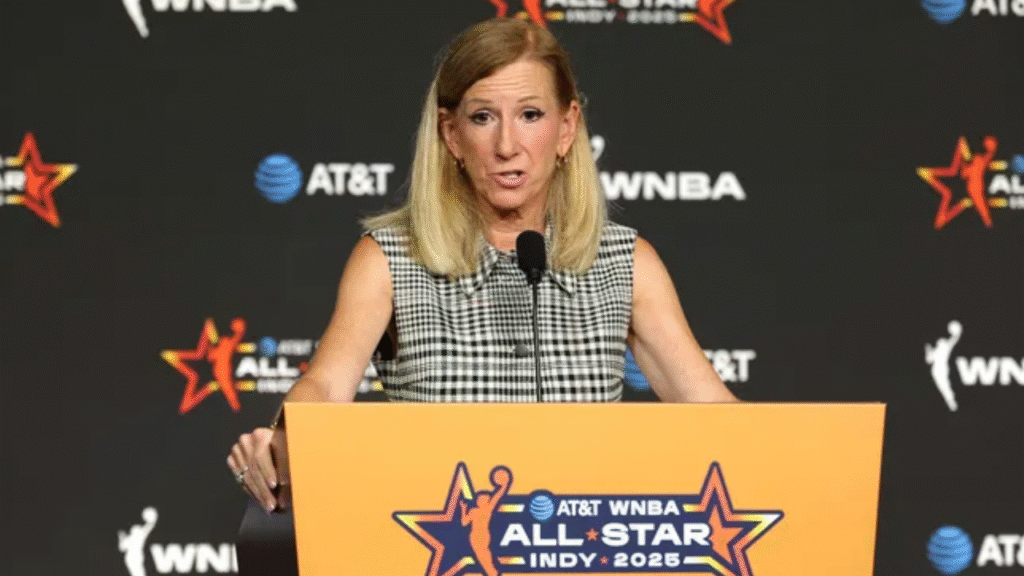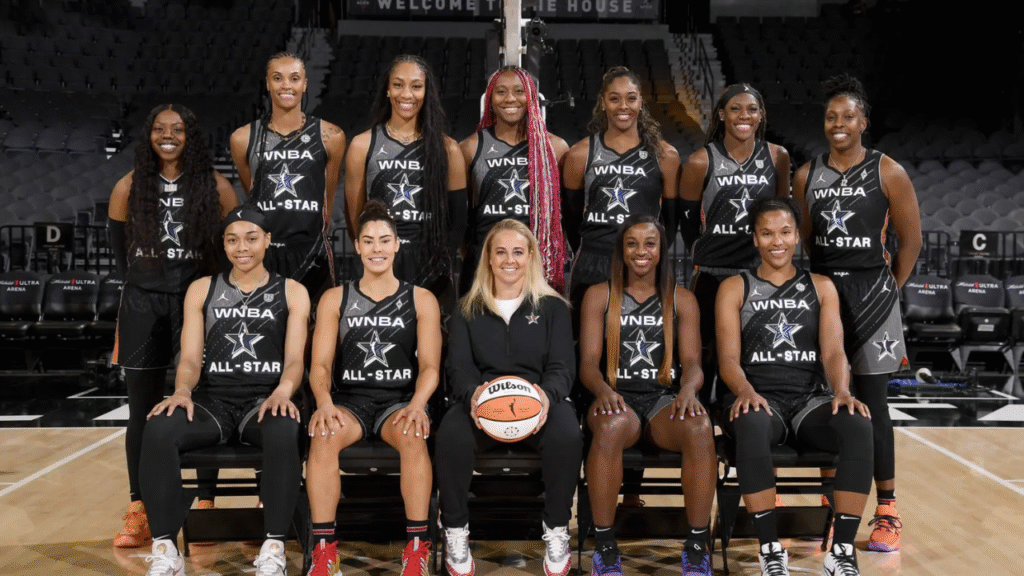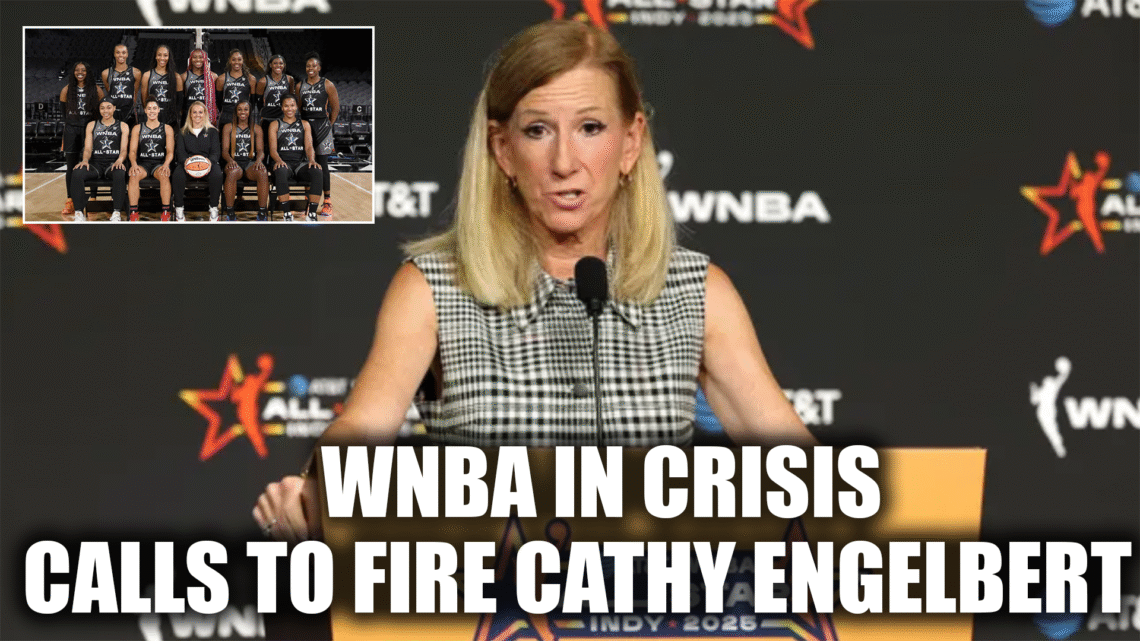In recent weeks, the WNBA has found itself in the spotlight—not for the on-court action, but due to growing criticism of its leadership. At the center of this storm is Commissioner Cathy Engelbert, whose tenure has been both praised for achievements and criticized for controversies. As the league navigates a critical stage in its history, the pressing question arises: how did we get here?Fire WNBA Commissioner Engelbert has become a major topic in women’s basketball. Criticism of her leadership has grown as players and fans question her decisions and responsiveness to their concerns. The controversy highlights tensions between the league’s executives and its athletes.

The Rise of Cathy Engelbert
Cathy Engelbert made history in 2019 when she became the first-ever commissioner of the WNBA. Coming from a successful career as CEO of Deloitte, she brought strong leadership skills and a fresh vision for the league. Under her tenure, the WNBA achieved several milestones: media deals expanded, player salaries increased, and the league gained heightened national visibility. Many viewed her appointment as a bold step toward modernizing and elevating professional women’s basketball.
The Turning Point: Criticism from Within
Despite these achievements, Engelbert’s leadership has faced increasing scrutiny. Tensions peaked when Minnesota Lynx star Napheesa Collier, who also serves as WNBPA vice president, openly criticized the league’s leadership. She described the league’s management as failing its players and called for urgent reforms, highlighting an apparent disconnect between players and executives.
The Controversial Conversation
One incident intensified the backlash: Collier alleged that Engelbert told her that superstar players should be “grateful” for the platform the league provides. Comments like these were widely seen as dismissive, especially given the WNBA’s ongoing efforts to champion equality and fair compensation for women athletes. Many players viewed these remarks as tone-deaf and misaligned with the league’s values.
Widespread Player Support for Collier
Collier’s public criticism resonated strongly across the WNBA. Players and coaches rallied behind her, echoing concerns over inconsistent officiating, inadequate salaries, and a lack of genuine communication from league leadership. The collective voice of the players underscored a broader demand for accountability and transparency within the league’s executive ranks.
The League’s Response
In response to the criticism, Commissioner Engelbert issued a general statement expressing disappointment about the portrayal of the league’s leadership. However, she did not directly address the specific allegations, which fueled further dissatisfaction among players. The lack of a clear, actionable response raised questions about the league’s commitment to addressing its internal challenges.
Lessons from Real-Life Leadership Conflicts
Leadership controversies in sports are not unique to the WNBA. Similar situations in professional leagues, like those in the NFL and NBA, show that ignoring player concerns can damage trust, affect team morale, and even impact league growth. The WNBA now faces the opportunity to learn from these examples by proactively engaging with players and fostering open, respectful dialogue.
Tips for Rebuilding Trust
- Transparent Communication: Regularly engage players in meaningful conversations about league policies and decisions.
- Accountability Measures: Ensure leadership is held responsible for missteps, creating a culture of integrity.
- Player Inclusion: Involve players in decisions affecting salaries, schedules, and league operations.
- Active Listening: Leaders must actively respond to concerns instead of offering vague statements.
The Road Ahead
The WNBA is entering a pivotal period with the upcoming expiration of its current collective bargaining agreement. Player trust and league credibility are on the line. Whether Commissioner Engelbert remains in her role or a leadership change occurs, the league’s future depends on its ability to unite its stakeholders and prioritize player welfare.
Conclusion
The calls for Commissioner Cathy Engelbert’s dismissal reflect not just individual grievances but also deeper systemic issues within the WNBA. Addressing these challenges requires proactive communication, genuine accountability, and a commitment to player empowerment. By taking decisive steps now, the WNBA can strengthen its foundation and continue to thrive as a leading women’s sports league.

FAQs
1. Why are people calling for Cathy Engelbert’s resignation?
Critics, including key players like Napheesa Collier, accuse Engelbert of poor leadership, dismissing player concerns, and making insensitive remarks about player recognition and compensation.
2. How has the WNBA responded to these criticisms?
Engelbert issued a general statement expressing disappointment about how her leadership was portrayed but did not directly address the allegations.
3. What impact has this controversy had on the WNBA?
The controversy has sparked widespread debate about leadership, player welfare, and the league’s future direction, highlighting the need for systemic improvements.
4. How can the WNBA rebuild trust?
Through transparent communication, accountability, inclusive decision-making, and policies prioritizing player welfare.
5. Will Cathy Engelbert remain as commissioner?
Her future is uncertain. The league is considering options, but no official decision has been announced.





